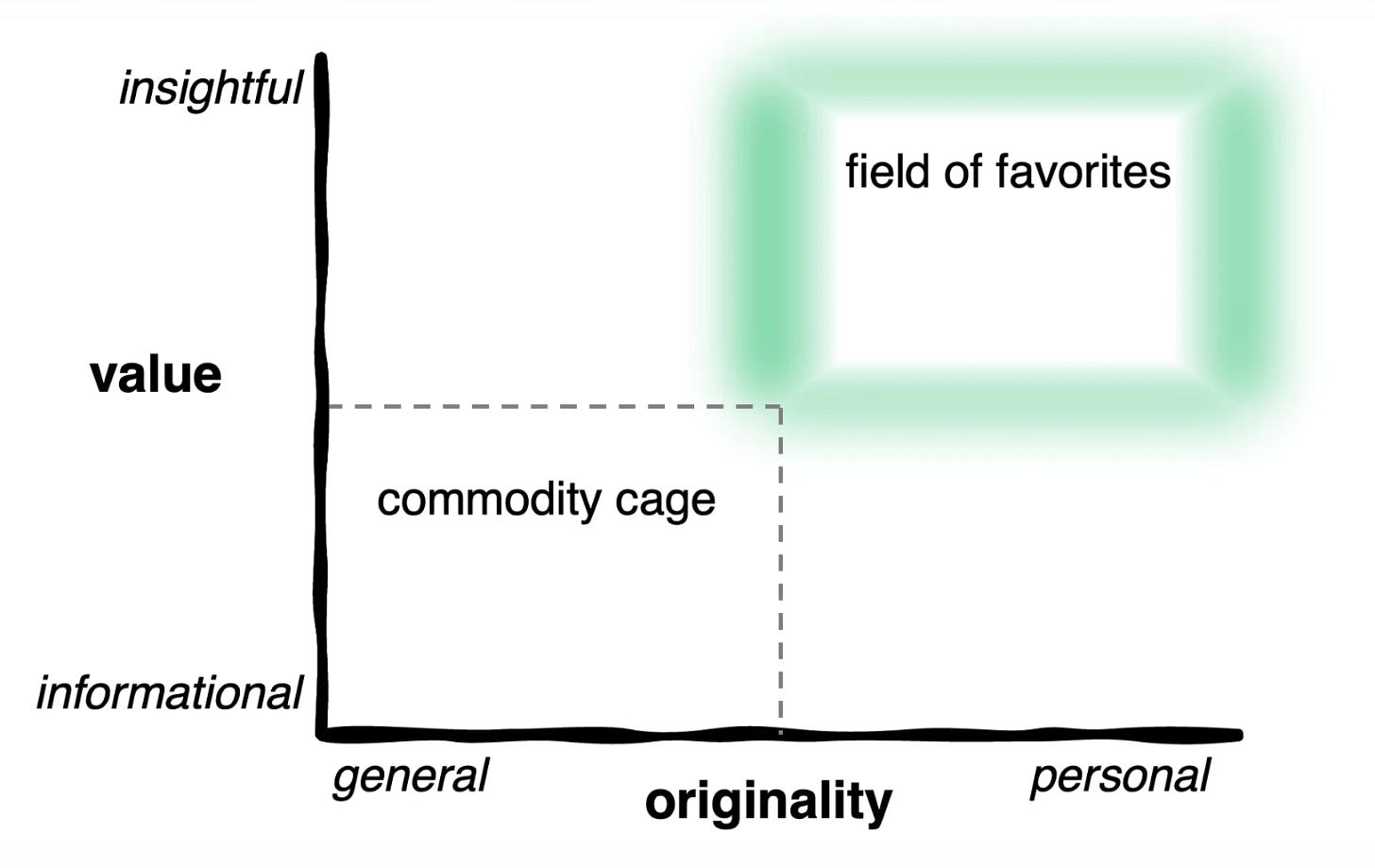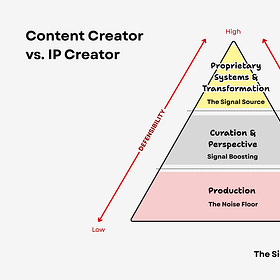Don't Be an AI Commodity
Don't be an AI Commodity: AI makes everyone ‘good enough.’ Your edge will be solving problems only YOU see.
I can now confirm it. Maybe you can relate.
I think faster when I type than when I handwrite.
I discovered this one morning during my Bible study.
Thoughts were flowing faster than my hand could keep up writing on my iPad screen.
It felt like trying to catch raindrops with my kid's teaspoon.
I paused, decided to connect a small external keyboard sitting beside me, and it changed everything from there.
Words poured out.
I captured raw, unfiltered ideas, and at lightning speed.
Unlike when I was writing by hand, I wasn’t editing myself as I went; I was creating.
And this tiny workflow shift exposed me to a realisation.
Yes, I have a fine handwriting.
But...
My edge isn’t in the perfect, handwritten note.
It was in the messy, rapid-fire capture of authentic thought that would be useful to me as well as someone else.
AI can write a perfectly polished sentence. ChatGPT may have even asked you, "Do you want me to polish it into a ready-to-post format for a specific platform?"
But it can’t replicate my unique process for chasing an idea.
I know the rise of AI is beginning to unsettle many professionals.
It feels like a wave is coming for us all.
A wave that threatens to wash away what makes us unique, turning our hard-earned expertise (for me, since 2006) into a commodity that AI can spit out in 30 seconds or less.
I don't think the fear is about job security.
It's about losing relevance.
It's the quiet whisper of: "If AI can do the 'what,' then what is my value?"
I received an email from a subscriber few weeks ago that got me thinking hard.
In it, they confessed:
Have incubated like 10 different books but I couldn’t continue or even start some... I’m actually stalked [by my ideas] and I can’t move but this particular write up just embraced me as I am and it’s telling me I’m not alone.
This feeling of being "stalked by your own ideas" is the direct result of the biggest lie we multi-skilled professionals are ever told:
That you are a dabbler.
Today, we're not just challenging that lie.
We are destroying it.
Your scattered genius isn't a weakness. It is your single greatest defence in the new age of AI.
And...
As AI makes everything “good enough,” your true, unshakeable edge isn’t in doing things better.
It’s in doing things differently.
It’s in solving problems only you can see.
Let me tell you a bit of my story...
An unexpected journey into a Radical Problem
When I joined my startup in 2022, I stepped into the world of AgeTech: technology for ageing.
It was a field I had a stint research interest in while I was in my home country, but hadn't explored or pursued.
The job became a force function.
It forced me to fall in love with a problem most of the tech world was ignoring.
I remember my first task was like a baptism of fire: getting the startup through a Design Stage Gate with UKRI and quickly learning some other software and tools on the fly.
For the typical-brained person, that was enough to overwhelm a new team hire. But not for me.
As a multi-skilled professional, that intense start shaped everything that followed.
Over the next three years, I wore many hats.
I led interface redesigns to improve accessibility.
I ran user discovery and user testing sessions.
I contributed to marketing strategy and designed investor decks.
I oversaw design interns and supported decisions across the entire product.
I found we weren't just building an app.
We were solving a radically different problem: the profound lack of dignity in how technology treated older adults.
The industry saw "users."
We saw humans deserving of respect and empowerment.
This focus became our edge.
It led us from co-design sessions to launching our research app, to integrating fall risk assessments, and redesigning it all for a version 2 in July this year.
This mission-driven focus earned us a pilot with Glasgow City Council, and recognition from the World Economic Forum as Top 10 innovator startups in the world.
Coming back to AI...
AI can optimize a workflow.
It can generate code for a feature.
But it can't fall in love with a problem.
It can't 'yet' feel the burning need to serve an overlooked community.
That is a uniquely human edge.
Category Pirates once wrote that your goal is to "move the world from the way it is, to the way you want it to be."
Our edge came from a deep desire to redesign a small corner of the world.
Everyone screams about Replacement; Real threat is Sameness
The danger of AI isn't that it will take your job.
If AI is coming for your job, that's a good sign your job needs a different version of who you think you are. I wrote about what to do here.
Is AI coming for your job? Good.
Find out how you can raise your standards as a multi-skilled professional
The real danger that I see is that it will make everyone sound the same.
It creates what Jay Acunzo calls "commodity content."
He describes it as a "commodity cage, "where everyone is on a hamster wheel, creating more and more content that feels identical.

As he explains, your goal isn't to be the "best" on the hamster wheel.
Your goal is to get off it entirely and enter a new "field of favorites" where you become the big fish in a small share of an entire market.
This is where your work is both insightful and deeply personal - the top-right quadrant of the matrix.
Jay says, "No amount of reach matters if you don’t resonate. The point of this work is to ensure others actually care."
AI operates in the bottom-left quadrant: informational and general. (At least, for now)
Your survival depends on moving to the top-right.
Your expertise [and products] must come from you.
How do you build that resonant, personal, unshakeable edge that is anti-commodity?
Here are three ways to start.
Edge 1: Build a "Psychological Moonshot," not a logical feature
If I'm walking on the road and I hit my leg, I'll look back to check and almost analyse how it happened.
Tells you I'm extremely logical.
AI is also brilliant at logic. That’s what it’s developed to do, as history tells us.
It can optimize, analyze, and execute based on data.
But it can't soothe anxiety. It can't create delight.
It can't address unspoken human emotions.
Something Linda Zhang calls building "psychological moonshots."
In her article, she writes, "What’s often forgotten is the impact of human emotions... Pain is an emotion, desire is an emotion. Emotion is where magic happens."
She gives the perfect example:
"Uber’s killer feature was the Map showing you exactly where your car is. The key insight is that people hate not knowing if and when their car is about to arrive. It makes them feel powerless. The Map soothes their anxiety."
Uber didn't solve transportation. They solved a feeling.
That is an edge AI cannot replicate.
Edge 2: Become a "Category of One"
Your greatest strength as a multi-skilled professional is the very thing you've likely been told is a weakness: your scattered interests and multiple skills.
This is where you stop being a dabbler and start integrating.
Tim Grover, author of From Good to Great to Unstoppable, warns:
"You don't become unstoppable by following the crowd, you get there by doing something better than anyone else can do it, and proving every day why you're the best at what you do. You must know someone like this: he can do everything. This week he is a blogger and a songwriter and a motivator, last week he was teaching tennis two nights a week and working as a sushi chef. You listen to him and feel as if you've never done a thing in your life. Until you listen more closely and discover that like a lot of people, this is someone dabbling in a lot of things and succeeding in none..."
The key isn't to do more things.
But to combine them into something no one else can offer.
My work at our startup is a blend of product design, user research, marketing, and a deep empathy for the ageing community. That combination is my unique category.
Being interdisciplinary is a superpower.
Linda Zhang echoes this:
"It enables you to connect seemingly unrelated ideas. Like Steve Jobs taking inspiration from calligraphy to inform the typography of the Mac."
AI is trained on existing categories.
You can - and should - create a new one.
Edge 3: Weaponize your little weird
Remember my typing story?
That's an edge I discovered I have.
My process, capturing raw thoughts at high speed and refining them later, is a system I have now built around how my brain works.
I've had to buy new devices and apps to support me. It’s a workflow weapon.
Jay Acunzo tells the story of marketer Michelle Warner, who started a newsletter about a bat in her house to make a point about business strategy.
It was her best-performing email in months.
You know why?
Because it was a small story with big meaning.
Acunzo notes, "A.I. is informed by large language models. YOU are informed by little life moments."
Let me repeat that… And you need to read it… sloooowlyyyyyy…
AI is informed by LARGE language models…
You are informed by LITTLE life moments
Your unique processes, your "little life moments," your weird ways of doing things, that's a moat AI can't cross.
Can you feed AI with those “little life moments”? I bet you can. That’s a different conversation.
It’s not just what you create; it’s how you create it.
You are The Antidote
AI won't replicate your righteous anger at a broken system.
It won't stumble upon your unique combination of skills.
It won't have a "typing-at-midnight" breakthrough that changes everything.
These are not bugs in your humanity; they are the features of your genius as a multipe skilled, multi-mastery professional.
They are your edge.
Questions for reflection:
What is an unspoken frustration or anxiety in your niche that you could solve? (Your Psychological Moonshot)
What two or three unrelated skills could you combine to create an offering no one else has? (Your Category of One)
What part of your personal workflow feels uniquely "you"? How can you build a product or service around that process? (Your Workflow Weapon)
Your Next Step:
I've created a simple data-driven Skills Assessment Tool to help you identify the raw materials for your three edges.
It’s a Google Sheet designed to help you pinpoint the skills worth amplifying - the ones that are uniquely yours.
Use it this week to identify your top 3 standout skills. Don't just list what you're good at. Find the intersections.
You are the antidote to AI sameness.
Go build your edge.
Live courageously,
Dayo Samuel 💯




